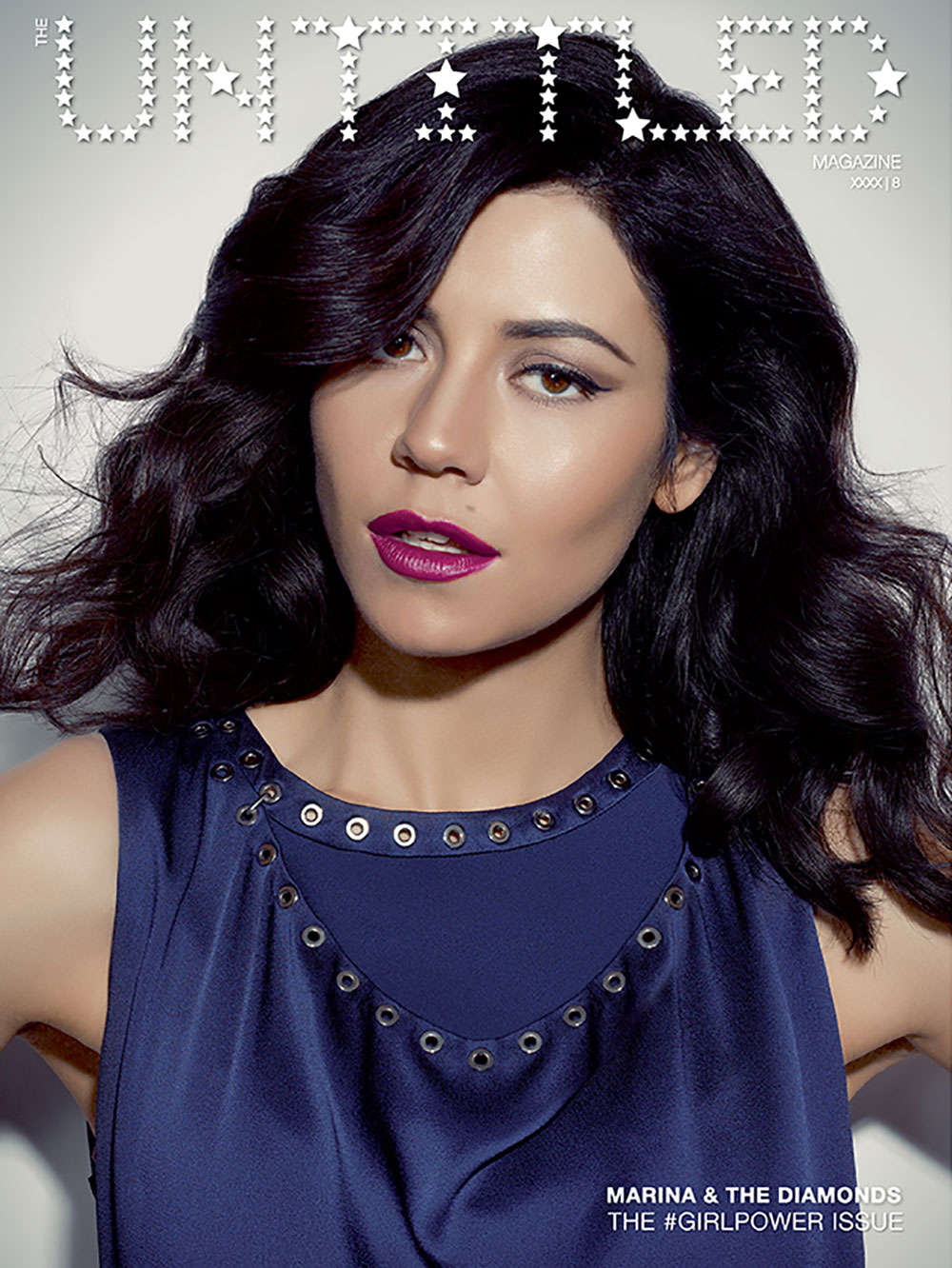
“I’m very unapologetically female, and I want to talk about real things from a female perspective. We don’t live in the 1600s. You don’t have to dumb yourself down just to please the industry.” -Marina Diamandis
In an age where gender pronouns are evolving, it’s easy to get wrapped up in the politics and lose sight of the core of any cultural revolution: the freedom to think, act, and speak as one wishes, unconstrained. Marina Diamandis, aka Marina & The Diamonds, has embraced this sentiment in her music and her life, and the world has followed. Her third and most recent album Froot is Marina’s first to break Top 10 on the US Billboard 200, debuting at No. 8. “I didn’t want to write an album just because I had a record deal and needed to release a record. I wanted to write a record about my life. It wasn’t for the love of other people, or so that I could have more fans or sell more records, it was because I wanted to document my life in this way.” Froot was released by Lizzy Plapinger’s label, Neon Gold Records.
MARINA AND THE DIAMONDS BEHIND THE SCENES VIDEO – THE #GIRLPOWER ISSUE 8
Photography and Video Direction by Indira Cesarine
Marina grew up in Wales with her Welsh mother and Greek father. “With Mediterranean culture, there’s a ton of punishment. Family is incredibly important, so it’s not true that the role of the woman is not important, it’s actually very important. The mom is a very essential figure to the family. But it’s more of the role of the mother.” That basic but powerful female archetype planted a seed in Marina, that would eventually blossom into an exploration of modern womanhood through music, notably on her 2012 sophomore album, Electra Heart, which debuted at No. 1 in the UK. A concept album, Electra Heart is also a character who interrogates various female stereotypes, with tracks such as “Teen Idle,” “Primadonna,” “Homewrecker,” and “Housewife” each exploring various female archetypes through the music and lyrics. It was the first project in which she was given more creative control. “I definitely felt undermined as an artist and as a songwriter, because although I was very pleased with the outcome, before Electra Heart, I was always encouraged to co-write with people and they were always men, always male producers, always male writers.”
Her personal creative vision is all-encompassing. Every aspect of her project, the album art, music videos, and even how she styles herself, has a unified and distinct theme that correlates with her inimitable sound. “For me, it’s such a pleasurable way to put my music across, or my ideas across…it has to be a 360 degree approach, otherwise it’s not going to work.” For Froot, this included neon fruit imagery, suggesting raw sensuality. In the music video for the title track, she wore classic Hollywood gowns. “I like taking something classic and feminine and almost re-crafting it in a digital and cyber way,” she says. “It’s relevant to our world today.”
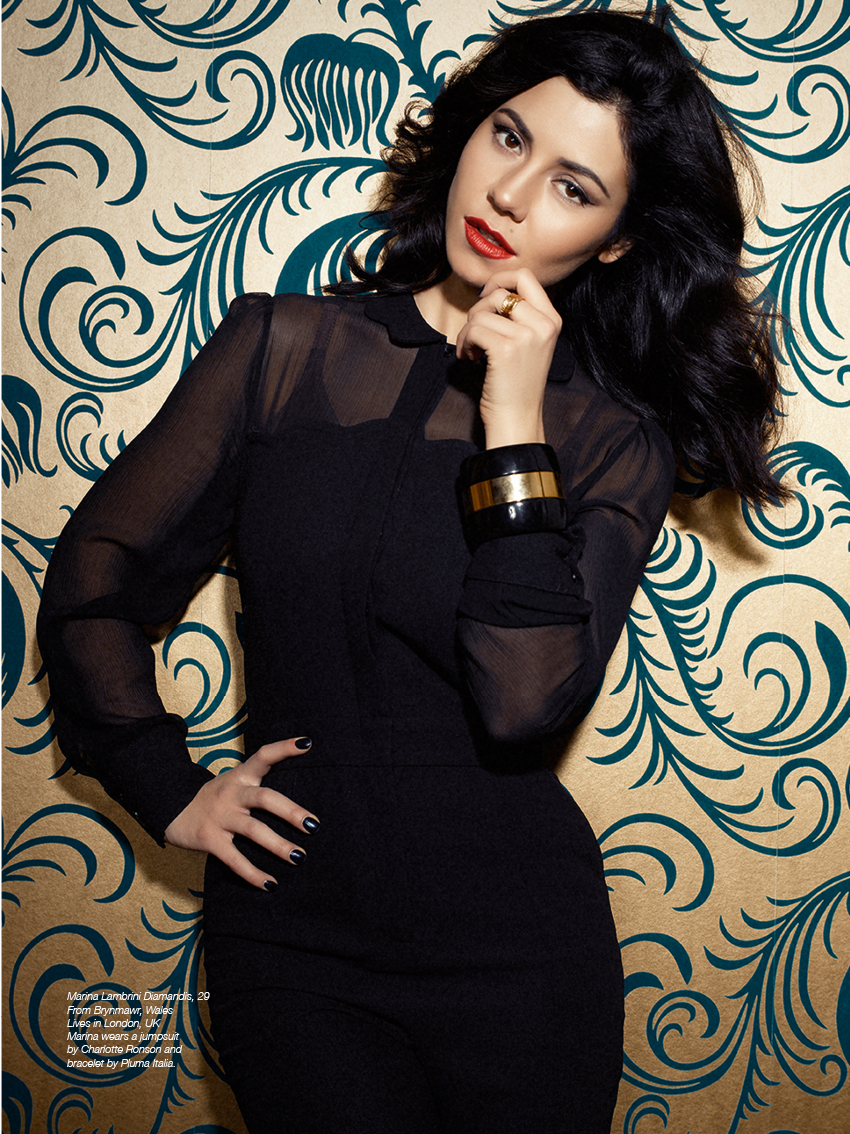
Marina uses deeper and broader strokes when she speaks of bringing people together, and the concept of unity was the inspiration for her moniker. “The ethos of it was to create something very inclusive. Because to me, music is about unifying people and making an environment that isn’t very hierarchical, it’s about togetherness. I like the idea of Marina & The Diamonds. It was more like a group.”
The one place where she does enjoy solace is when she’s writing. Froot was penned entirely by Marina. “The main reason was because I felt like it was the right thing to do. It wasn’t so much about empowering myself, it was more like, I felt that it was the right decision creatively. But looking back, I’m very pleased that I did it, and I hope that other artists do that too.” Taking ownership of her songwriting process allowed her to dig deep into herself. “When you’re on your own you can kind of just let things sink in and marinate. You’re able to properly digest your own thoughts and know exactly what you’re going to say.” In her hit “I’m a Ruin,” in which she inverts the classic breakup anthem, this sense of self-awareness is evident. “Quite a lot of the time you get songs about either being heartbroken or being someone who’s the dumper, but I think this time, this situation, I was in a spot about being incredibly guilty about hurting someone, so that was the main reason for writing it.”
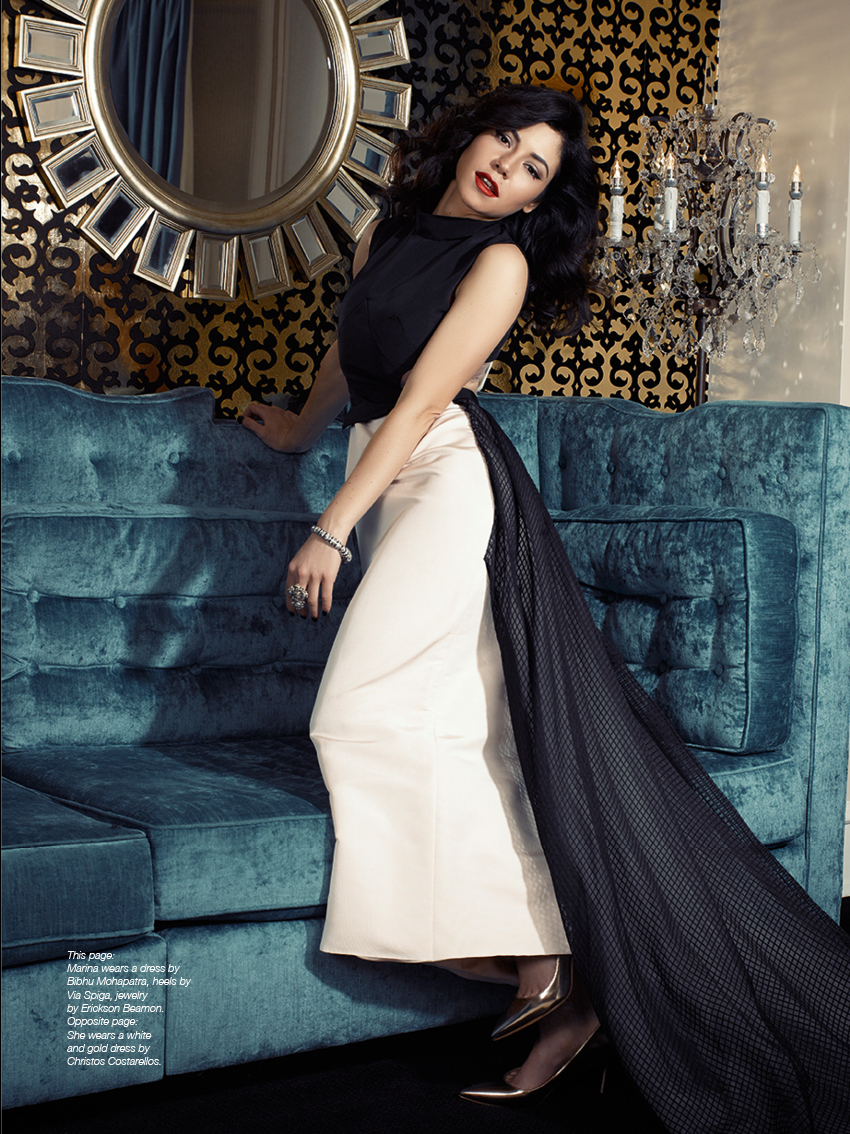
The cathartic nature of songwriting is what first drew her to music. “I was a little bit musical, but what attracted me mainly to music was the lyrical side and that was the only reason I wanted to do it. And the only reason I do it now is that I love the English language, and I found that to be a very convenient way and fine way to express myself.” Self-exploration through whatever means necessary is also the path to self-discovery, as demonstrated in Froot’s opening track, “Happy.” “I think it’s a great stage at the moment in pop culture, where we have a lot of young female artists who are willing to talk about [feminism]. When I think back to myself as a teenager, I would have loved to have that variation in that pop landscape of lots of different types of girls, not just the very prim, sexist, pop star.” Marina’s career is just getting started. “I feel like my notion of success has completely changed. I’m actually finding happiness and satisfaction as an artist, and I feel that was a long time coming.”
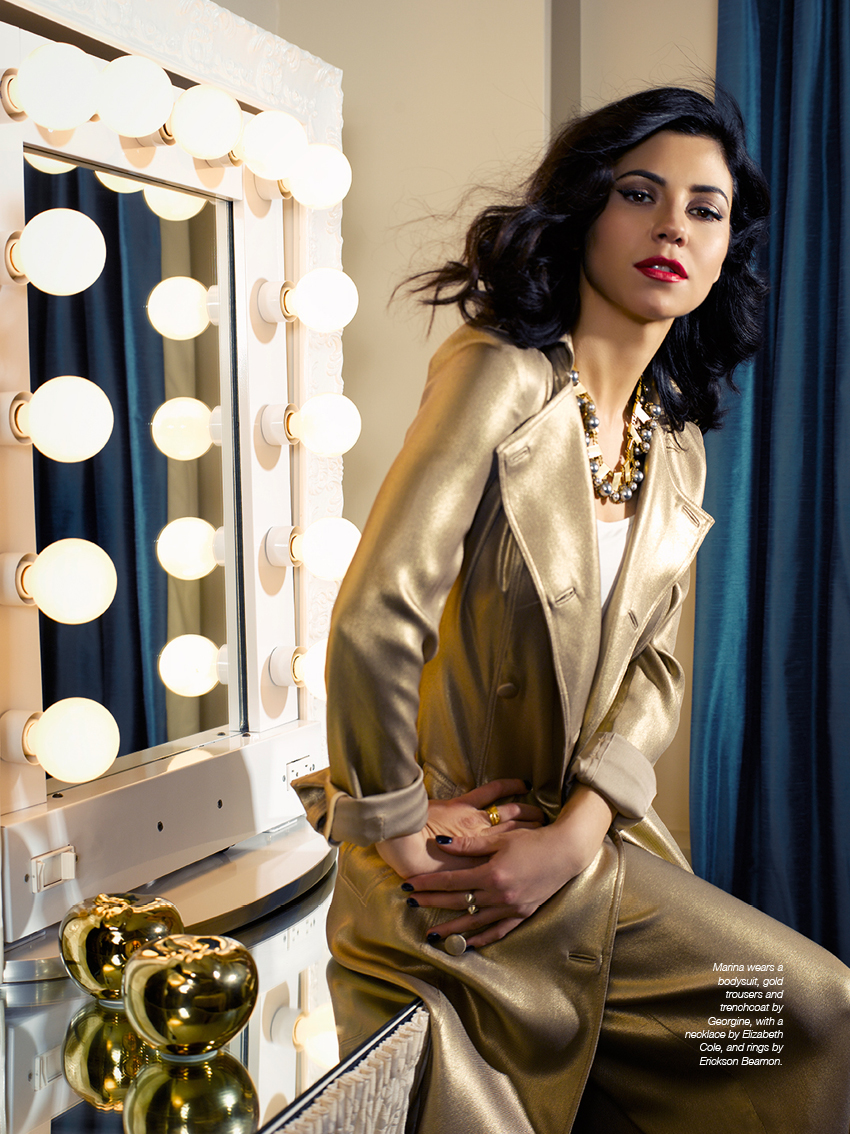
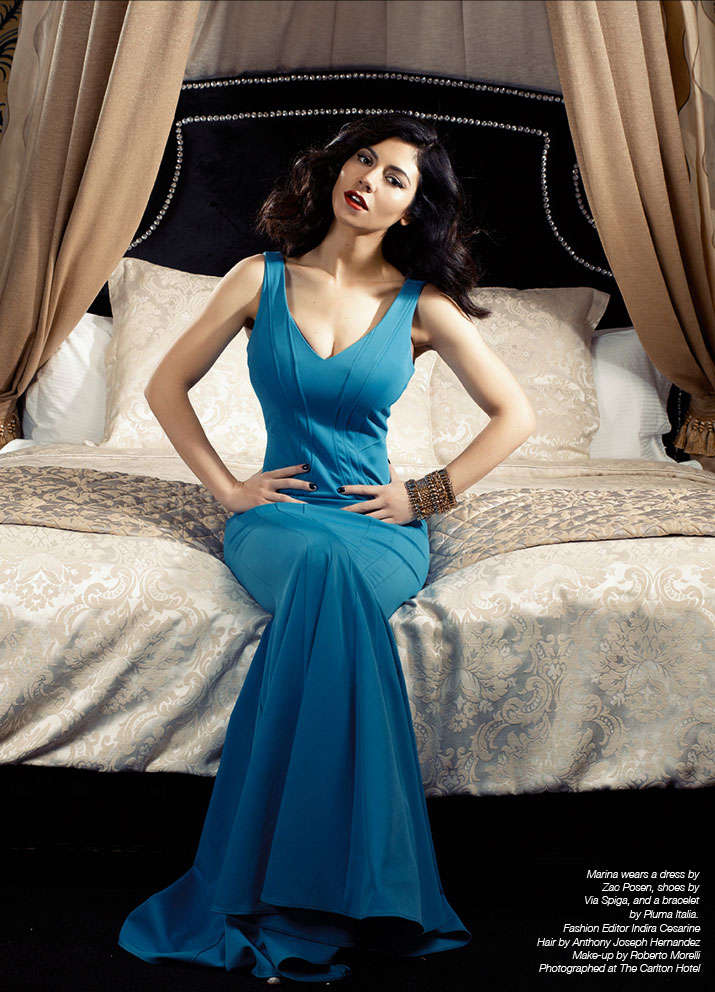

Photography and Interview by Indira Cesarine
for The Untitled Magazine #GirlPower Issue
Fashion Editor: Indira Cesarine
Make-up by Robert Morelli
Hair by Anthony Joseph Hernandez
Photographed at The Carlton Hotel
This article originally appeared in The #GirlPower Issue of The Untitled Magazine (2015), pick up a print edition of the issue today!


